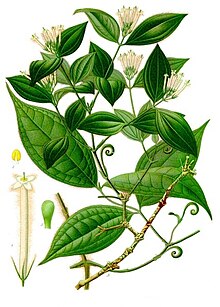You can help expand this article with text translated from the corresponding article in French. (March 2014) Click [show] for important translation instructions.
|
The article's lead section may need to be rewritten. (May 2019) |


Curare (/kʊˈrɑːri/ or /kjʊˈrɑːri/; kuu-RAH-ree or kyuu-RAH-ree) is a common name for various alkaloid arrow poisons originating from plant extracts. Used as a paralyzing agent by indigenous peoples in Central and South America for hunting and for therapeutic purposes, curare only becomes active when it contaminates a wound or is introduced directly to the bloodstream; it is not active when ingested orally.
Curare is prepared by boiling the bark of one of the dozens of plant sources, leaving a dark, heavy paste that can be applied to arrow or dart heads.
These poisons cause weakness of the skeletal muscles and, when administered in a sufficient dose, eventual death by asphyxiation due to paralysis of the diaphragm. In medicine, curare has been used as a treatment for tetanus and strychnine poisoning and as a paralyzing agent for surgical procedures.